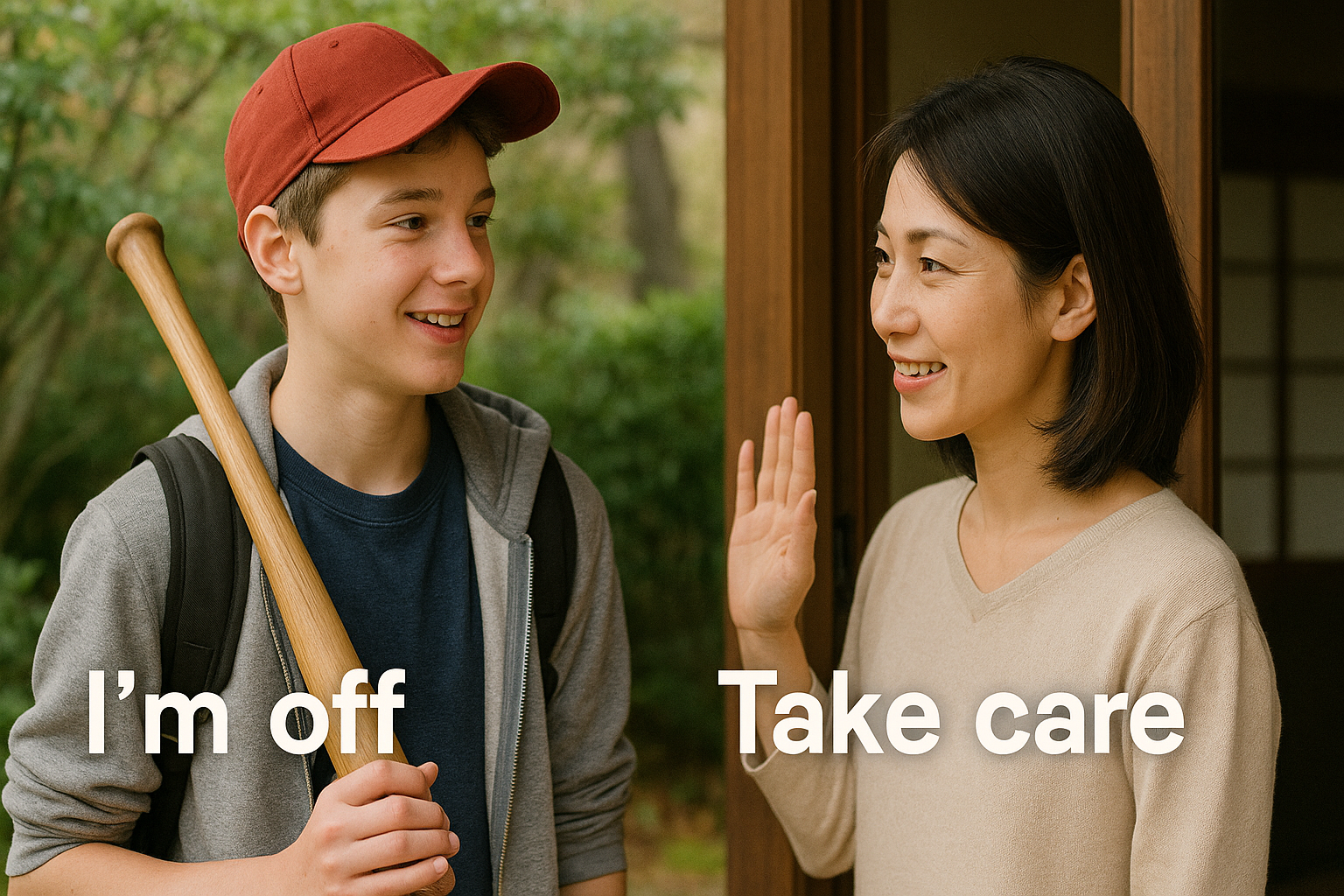Index
- 1 “Ittekimasu” and “Itterasshai” — The Warm Ritual Before You Step Out the Door
- 2 🏡 What Do “Ittekimasu” and “Itterasshai” Mean?
- 3 🌍 How Is This Different from Other Cultures?
- 4 🧠 Why Is It Culturally Significant?
- 5 💬 Useful English Expressions (and How They Compare)
- 6 🧳 Mini Scenario: Morning at a Japanese Home
- 7 🎌 Conclusion
- 8 P.S.
“Ittekimasu” and “Itterasshai” — The Warm Ritual Before You Step Out the Door
“When my Japanese host said ‘Ittekimasu!’ before leaving and the whole family responded with ‘Itterasshai!,’ I was stunned. We don’t have that in my country. It felt so… wholesome.”
— Jamie, 25, from Canada
In many Japanese homes, a small ritual takes place each morning:
A person calls out “Ittekimasu!” before leaving the house, and someone replies with “Itterasshai!”
To a Japanese person, this might seem completely ordinary. But for many foreigners, this custom is not only surprising—it’s deeply touching.
🏡 What Do “Ittekimasu” and “Itterasshai” Mean?
These expressions are deeply tied to Japanese culture and family values.
Let’s break them down:
- Ittekimasu “行ってきます“
Literally: “I’m going and will come back.”
Meaning: A polite way to say you’re heading out, with the nuance of “See you later.” - Itterasshai “いってらっしゃい”
Literally: hard to translate directly.
It’s a send-off filled with warmth—like saying “Take care,” “Have a nice day,” or “Come back safely.”
This isn’t just a verbal exchange. It reflects a mutual promise:
“I’ll return safely.” / “I’ll be here when you get back.”
🌍 How Is This Different from Other Cultures?
In most English-speaking countries, saying goodbye in the morning might be as simple as:
- “Bye!”
- “See you later!”
- “Have a good day!”
But phrases like “I’m leaving and I’ll be back” are rare, and family members don’t always respond with anything formal.
This makes the Ittekimasu / Itterasshai exchange quite special.
“Back home, I usually just grab my bag and go. But in Japan, every time I leave, someone acknowledges it. It makes you feel seen.”
— Carla, 30, from Spain
🧠 Why Is It Culturally Significant?
Japanese society values:
- Harmony within the household
- Clear communication of daily rhythms
- Emotional connection through routine
This daily ritual helps strengthen family bonds and provides a small sense of closure and care before starting the day.
In fact, kids in Japan often learn these phrases in early childhood. Even in anime and TV shows, you’ll hear this exchange all the time!
💬 Useful English Expressions (and How They Compare)
If you’re translating these phrases into English, here are a few natural options:
| Japanese | English Equivalent | Context |
|---|---|---|
| 行ってきます | I’m heading out / See you later | Said when you leave home |
| いってらっしゃい | Take care / Have a good day | Said to the person leaving |
Note: These are not perfect translations—because what’s missing is the emotional ritual behind the words.
🧳 Mini Scenario: Morning at a Japanese Home

行ってきます! “Ittekimasu!”

いってらっしゃい〜 “Itterasshai~“
気をつけてね! “Be careful!“
Now compare that with:

行ってきます! “Ittekimasu!”

いってらっしゃい〜 “Itterasshai~“
気をつけてね! “Be careful!“
One of these scenes feels warmer, doesn’t it?
🎌 Conclusion
Ittekimasu and Itterasshai are more than just words.
They’re everyday reminders of connection, routine, and love—something uniquely Japanese.
Next time you watch a Japanese drama or anime, listen for this little exchange. It might just make you smile.
P.S.
In fact, one study has shown that the probability of returning home safely without an accident is greatly increased by saying, “Ittekimasu”. Why don’t you try it even if you are not in Japan?
またね(Matane)!



コメント